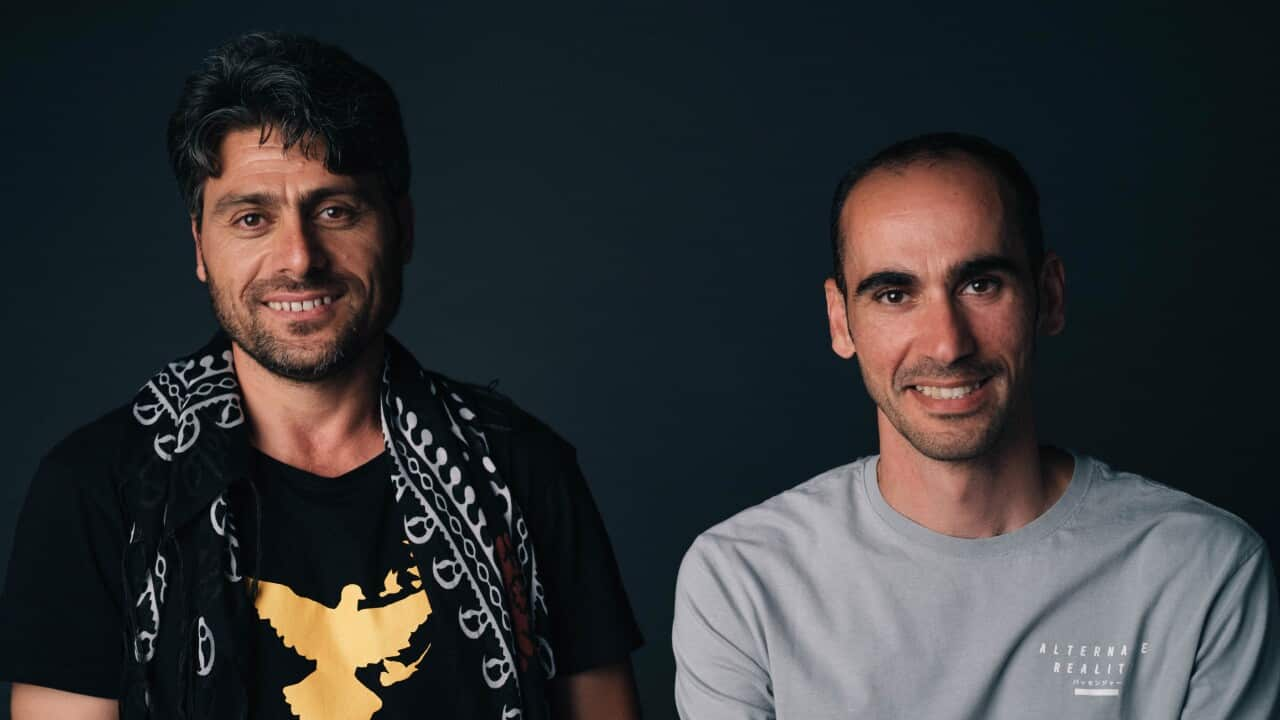Mostafa 'Moz' Azimitabar and Farhad Bandesh once called an Australian hotel room their prison.
Moved from Manus Island in 2019, the Kurdish-Iranian refugees spent several months in hotel detention.
"There was not a window … in front of the glass was a cement wall, not a tree, not nature," Mr Azimitabar told SBS News.
"I was locked up in an invisible coffin, they wanted to bury me alive."
With no access to sunlight or fresh air, for detaining him and other refugees and asylum seekers in hotels.
'My future is unclear'
But he said Immigration Minister Andrew Giles recently delivered the most difficult news: he would never be permanently resettled in Australia because he had arrived by boat.
"He told me that 'I am very serious, the policy will not going to be changed, and leave Australia'," he said.
Mr Bandesh said he received the same message from the Department of Home Affairs late last year.
"They send the letter to me, I cannot stay here longer," he told SBS News.
He was told he could move across the Tasman as part of , but doesn't want to.
"I am part of the Australian history now and I found connection with Australia people," he said.
"My future is unclear. The government to try and push us to go to another country after nearly 10 years of torture."
Mr Azimitabar and Mr Bandesh's journey is the subject of a new documentary, Freedom is Beautiful, which premiered on Sunday at the Sydney Film Festival.
Co-produced by Angus McDonald and Mélita Toscan Du Plantier, the film was supported by Amnesty International and executive produced by former Socceroo and human rights activist Craig Foster.
Mr Azimitabar and Mr Bandesh have used its release to call for an end to .
While now living in the community on temporary visas, they say they want justice for those who remain in detention — both offshore and in hotels.
"[I want the government to] apologise what they have done to me and others and they change the law forever," Mr Bandesh said.
"I am still suffering from pain, and I'm still suffering from those torture was on me."

Freedom is Beautiful made its world premiere at the Syndey Film Festival on Sunday. Source: SBS News
"This policy just continues at a cost to the taxpayers of $480 million for offshore processing next year," he told SBS News.
"When there's only 13 people left on Nauru, it's crazy and it's cruel."
This week, Australia is expected to find out if it will become the first OECD country to be placed on a United Nations non-compliance list over its failure to implement a human rights agreement it ratified in 2017.
All countries that have ratified the Optional Protocol to the Convention against Torture and other Cruel, Inhuman or Degrading Treatment or Punishment (OPCAT) must allow the UN's anti-torture body to attend their prisons and detention centres without notice, hindrance, or witnesses.
They are also required to establish an independent body to prevent torture, originally by January 2022. Australia lagged behind and was granted a one-year extension.
The Subcommittee on Prevention of Torture's (SPT) after it was restricted from accessing several areas where people were detained and wasn't given all requested documentation.
Mr Thom said it was "really rare" that the SPT would have to suspend a visit, especially in a country like Australia.
"This is extremely embarrassing," he said.
"But even more embarrassing was the fact that Australia tried to say that what's happening on Nauru shouldn't be included in our ratification of this convention against torture - to the OPCAT - when clearly if we are going to take human beings offshore and detain them in conditions that amount to cruelty, that should be part of the investigation.
"When we have this black cloud hanging over us, how can we consider ourselves a good international citizen?"

Graham Thom (centre) is Amnesty International Australia's refugee coordinator. Source: SBS News / Rashida Yosufzai
"Australia remains committed to its strong border protection policies," they told SBS News in a statement.
"These policies have successfully diminished the flow of unauthorised maritime arrivals to Australia, disrupted maritime ventures in the region, and prevented loss of life at sea."
Third-country migration options are available for "transitory persons" who are in Nauru or temporarily in Australia, the spokesperson said.
They include resettlement in the United States and , private sponsorship in Canada, or voluntarily returning to their home country or another nation they have permission to enter.
Readers seeking support with mental health can contact Beyond Blue on 1300 22 4636. More information is available at . supports people from culturally and linguistically diverse backgrounds.











